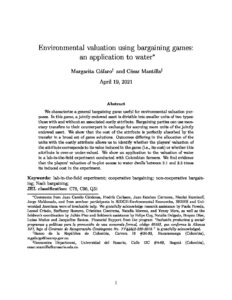We characterize a general bargaining game useful for environmental valuation purposes. In this game, a jointly endowed asset is divisible into smaller units of two types:
those with and without an associated costly attribute. Bargaining parties can use monetary transfers to their counterpart in exchange for accruing more units of the jointlyendowed asset. We show that the cost of the attribute is perfectly absorbed by the transfer in a broad set of game solutions. Outcomes differing in the allocation of the units with the costly attribute allows us to identify whether the players’ valuation of the attribute corresponds to its value induced in the game (i.e., its cost) or whether this attribute is over-or under-valued. We show an application to the valuation of water in a lab-in-the-field experiment conducted with Colombian farmers. We find evidence that the players’ valuation of in-plot access to water dwells between 2.1 and 3.5 times its induced cost in the experiment.
Autores:
- César Mantilla
- Margarita Gáfaro
Palabras clave:
- Cooperative bargaining
- Lab-in-the-field experiment
- Nash bargaining
- Non-cooperative bargaining
Categorías:
- Proyecto 6
- Documentos de trabajo
